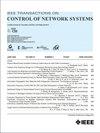影响网络的不同私人意见动态
IF 5
3区 计算机科学
Q2 AUTOMATION & CONTROL SYSTEMS
引用次数: 0
摘要
本文提出了一种包含差分隐私机制(dpm)的统一影响网络模型,称为差分私人意见动力学(DPODs)模型。在该模型中,每个个体使用受保护的意见而不是他/她的邻居的私人意见来更新他/她的私人意见,其中个人的受保护意见是私人意见和随机噪声的混合,遵循拉普拉斯分布。基于随机分析技术和矩阵理论,我们证明了所考虑的影响网络在控制个体敏感性和相互作用权重的特定条件下收敛。此外,利用马尔可夫不等式估计所有个体的最终意见收敛到由其初始意见凸包形成的邻域的概率下界,建立了与收敛精度相关的统计性质。我们进一步进行了差异隐私分析,以验证拟议的dpm在保护所有个人私人意见方面的有效性。最后,本文提供了两个例子,包括一个空手道俱乐部网络,以阐明理论结果的有效性。本文章由计算机程序翻译,如有差异,请以英文原文为准。
Differentially Private Opinion Dynamics of Influence Networks
In this article, a unified influence network model incorporating differential privacy mechanisms (DPMs), called the differentially private opinion dynamics (DPODs) model, is proposed. In this model, each individual uses protected opinions rather than the private opinions of his/her neighbors to update his/her private opinions, where the protected opinion of an individual is a blend of private opinions and random noise following Laplace distribution. Building on stochastic analysis techniques and matrix theory, we show that the influence network under consideration converges under specific conditions governing individual sensitivities and interaction weights. In addition, the statistical properties related to convergence accuracy are established by utilizing the Markov inequality to estimate a lower bound on the probability of all individuals' final opinions converging to a neighborhood formed by their initial opinions' convex hull. We further conduct a differential privacy analysis to validate the efficacy of the proposed DPMs in safeguarding the private opinions of all individuals. Finally, two examples, including one of the Karate-Club networks, are provided to shed new light on the effectiveness of the theoretical results.
求助全文
通过发布文献求助,成功后即可免费获取论文全文。
去求助
来源期刊

IEEE Transactions on Control of Network Systems
Mathematics-Control and Optimization
CiteScore
7.80
自引率
7.10%
发文量
169
期刊介绍:
The IEEE Transactions on Control of Network Systems is committed to the timely publication of high-impact papers at the intersection of control systems and network science. In particular, the journal addresses research on the analysis, design and implementation of networked control systems, as well as control over networks. Relevant work includes the full spectrum from basic research on control systems to the design of engineering solutions for automatic control of, and over, networks. The topics covered by this journal include: Coordinated control and estimation over networks, Control and computation over sensor networks, Control under communication constraints, Control and performance analysis issues that arise in the dynamics of networks used in application areas such as communications, computers, transportation, manufacturing, Web ranking and aggregation, social networks, biology, power systems, economics, Synchronization of activities across a controlled network, Stability analysis of controlled networks, Analysis of networks as hybrid dynamical systems.
 求助内容:
求助内容: 应助结果提醒方式:
应助结果提醒方式:


